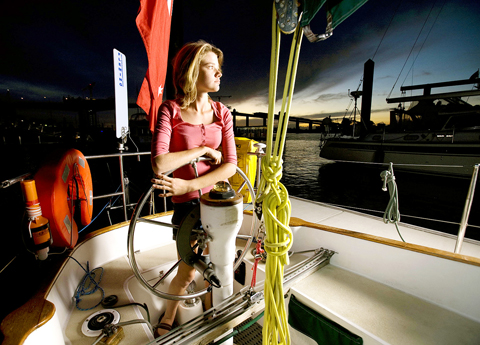Jessica Watson stares out at the expanse of Pacific Ocean from the deck of her family home. The sun glistens off the calm sea and all appears tranquil.
In September, Watson’s experience of the ocean will likely be much different — she’ll be attempting to become the youngest person to sail solo, nonstop and unassisted around the world.
She’ll start the voyage at the tender age of 16, which has triggered animated debate in Australia about her parents and their decision to approve such a journey.

PHOTO: AFP
“You’ve got to have a goal, you’ve got to go for something,” Watson said in an interview. “I have the experience, I have the team, I have the preparations. I think I can do it.”
Sailing in her newly refit 10m yacht, Watson will cover nearly 42,600km (23,000 nautical miles) on a journey that will take her from Australia’s east coast and across the equator, south to Cape Horn at the tip of South America, across the Atlantic Ocean to South Africa, through the Indian Ocean and south of Australia back home.
She expects the trip to take her seven to eight months — “230 days hopefully” — she says, at which time she would become the youngest person to complete a solo unassisted circumnavigation.
The previous mark is held by another Australian, Jesse Martin, who was 18 when he completed the journey in 1999. An American, 17-year Zac Sunderland, is in the latter stages of completing a solo, around-the-world trip, although it’s not in the “unassisted” category.
“Without assistance” means that a vessel may not receive any kind of outside help or take on board any supplies, materials or equipment during the attempt. A craft may be anchored or beached during the attempt, but any repairs must be made without outside resources, materials or help.
Watson, who was inspired by fellow Australian Kay Cottee, the first woman to sail solo nonstop unassisted around the world, could easily beat the record in both age and time, but the very fact that a slight, less than 50kg teenage girl will be attempting such an arduous and dangerous trip has raised its share of eyebrows.
John Morrissey of the Australian Family Association said his rather strong criticism of Watson’s trip has led to “more flak from sailor types than anything else I’ve commented on.”
Morrissey, a school teacher, stands by his comments that a 16-year-old girl should still be in school. Watson, an 11th-grader who studies through correspondence, hasn’t attended a regular school since the ninth grade.
“I think she’s too immature, both physically and psychologically, to do something like this,” Morrissey said. “It’s sure putting a big load on her guardian angel.”
An informal Internet poll in her local Sunshine Coast newspaper marginally approved of Watson’s plans. Forty-seven percent said they thought experience was more important than age, 39 percent said she was too young, and 12 percent said they’d like to meet her first before commenting.
That 12 percent would probably be impressed.
Watson seems mature for her age, and has been sailing since she was 8. Her New Zealand-born parents, former real estate man Roger and mother Julie, lived for more than five years on a 15m motor boat with Jessica, her sister Emily, 17, brother Tom, 14 and younger sister Hannah, 11. Before that, the family spent two years traveling around Australia in a motor home.
Watson said she expected some criticism.
“As long as it’s sensible and good advice, you listen to it all,” she said. “The one thing I won’t accept is when someone calls this reckless. This is years and years of planning and preparation. We haven’t just jumped into this.”
Watson and her family have already spoken to Australian and New Zealand search-and-rescue officials. She’s studied navigation, electronics and safety procedures.
She and her mother are seeing a nutritionist to best plan the freeze-dried meals she’ll have on board for the journey, and she recently completed a maritime first-aid course.
“I learned about hypothermia, every kind of wound,” she said of the course. “I stitched up some chickens and stabbed a few oranges.”
Watson is allowed to catch fish, but admits a fishing rod is not “big on the agenda” because of the possibility of falling overboard. When she leaves Australia, she’ll have only about 360 liters of fresh water with her, but her sails and a gutter system on the boat will help her capture rainwater. A cooking stove will operate on methylated spirits, as propane gas was deemed to be too heavy and dangerous to take on board.
Don McIntyre of Hobart is a 40-year sailing veteran who circumnavigated the globe in 1990-1991. He’s providing the boat Watson will use and has helped the family in its preparations, along with a handful of sponsors who are providing sails, rigging and safety gear.
“I believe there is a lack of young people who want to live their dream,” McIntyre said.

Taiwanese badminton player Lin Chun-yi had to settle for silver in the men’s singles at the Orleans Masters in France on Sunday after losing in the final to his French opponent. The 25-year-old Lin, ranked world No. 14, lost to Alex Lanier 13-21, 18-21 in a match that lasted 42 minutes at the Palais des Sports arena. It was the first time that the two players were facing each other in their professional careers. In the opener, Lin was slow to warm up, which gave the 20-year-old Lanier an opportunity to take an early lead with seven consecutive points. Despite

Paris Saint-Germain on Tuesday held their nerve to beat Liverpool 4-1 on penalties and reach the UEFA Champions League quarter-finals after their tie finished one-apiece on aggregate, while Bayern Munich saw off Bayer 04 Leverkusen to complete a 5-0 win over both legs. Lamine Yamal and Raphinha fired Barcelona into the next round as the Catalans bested SL Benfica 3-1, and Inter booked a last-eight meeting with Bayern by seeing off Feyenoord 2-1. At Anfield, Ousmane Dembele netted the only goal of the night as PSG bounced back from Liverpool’s late winner last week to force the tie to extra-time and penalties. Maligned

Taiwan’s Lin Chun-yi on Wednesday inflicted a first-round defeat on former badminton world No. 1 Viktor Axelsen at the All England Open. Lin came out of top after a back-and-forth first game before Axelsen dominated the second, but the Dane was not able to keep that form in the decider as Lin reeled off six points in a row on the way to a 21-19, 13-21, 21-11 victory. “If I don’t play my best, everyone can win against me,” said Axelsen, the world No. 4. “Today’s opponent played a fantastic game; it was disappointing, but that is how it is.” “I just tried

Two-time Indian Wells champion Iga Swiatek on Thursday avenged her shock Paris Olympics loss to Zheng Qinwen with a 6-3, 6-3 win over the Chinese eighth seed, setting up a semi-final against 17-year-old Russian Mirra Andreeva in the California desert. In the men’s singles, Spain’s Carlos Alcaraz put on a show with his acrobatic shotmaking under the lights to close out the day’s action, overcoming a 4-1 second-set deficit to defeat Francisco Cerundolo 6-3, 7-6 (7/4), while Taiwan’s Hsieh Su-wei crashed out of the women’s doubles. Swiatek, one of the gold medal favorites when she lost to eventual champion Zheng in the